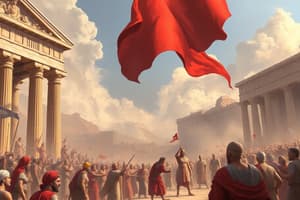Podcast
Questions and Answers
What is a significant limitation of the Thucydides Trap framework in analyzing conflicts?
What is a significant limitation of the Thucydides Trap framework in analyzing conflicts?
- It is too simplistic for modern conflicts.
- It overlooks domestic political influences. (correct)
- It only considers economic factors.
- It does not account for leadership dynamics.
What consideration is important for managing rising power relations?
What consideration is important for managing rising power relations?
- Enhancing diplomacy and communication. (correct)
- Ignoring historical contexts.
- Adopting a strictly aggressive strategy.
- Maintaining a rigid policy framework.
Why is it difficult to predict the outbreak of conflict in the context of the Thucydides Trap?
Why is it difficult to predict the outbreak of conflict in the context of the Thucydides Trap?
- The exact threshold of threat is uncertain. (correct)
- Utilizing simplistic indicators is ineffective.
- There are too many historical precedents.
- Power shifts are always gradual.
Which aspect emphasizes the complexity of the current international system?
Which aspect emphasizes the complexity of the current international system?
What is a suggested approach when analyzing regional cases in the context of rising powers?
What is a suggested approach when analyzing regional cases in the context of rising powers?
What does the term 'Thucydides Trap' primarily refer to?
What does the term 'Thucydides Trap' primarily refer to?
Which of the following is NOT a key aspect of the Thucydides Trap?
Which of the following is NOT a key aspect of the Thucydides Trap?
What historical event is often cited as a primary example of the Thucydides Trap?
What historical event is often cited as a primary example of the Thucydides Trap?
Which factor is suggested to exacerbate the tensions in the Thucydides Trap?
Which factor is suggested to exacerbate the tensions in the Thucydides Trap?
How does the theory view the psychological aspect of international relations?
How does the theory view the psychological aspect of international relations?
What is a common criticism of the Thucydides Trap theory?
What is a common criticism of the Thucydides Trap theory?
What example illustrates the Thucydides Trap in the 20th century?
What example illustrates the Thucydides Trap in the 20th century?
Which scenario best demonstrates the concept of the security dilemma within the Thucydides Trap?
Which scenario best demonstrates the concept of the security dilemma within the Thucydides Trap?
Flashcards
What is the Thucydides Trap?
What is the Thucydides Trap?
A theory arguing that a rising power often threatens a dominant power, leading to conflict.
What is a 'rising power' in the Thucydides Trap?
What is a 'rising power' in the Thucydides Trap?
A state's growing capabilities in areas like economy, military, or technology.
What is an 'existing power' in the Thucydides Trap?
What is an 'existing power' in the Thucydides Trap?
The established power feeling threatened by the rising power's growth.
What is the 'security dilemma' in the Thucydides Trap?
What is the 'security dilemma' in the Thucydides Trap?
Signup and view all the flashcards
How do 'miscalculations' play a role in the Thucydides Trap?
How do 'miscalculations' play a role in the Thucydides Trap?
Signup and view all the flashcards
What is 'deterrence failure' in the Thucydides Trap?
What is 'deterrence failure' in the Thucydides Trap?
Signup and view all the flashcards
Why is the international system part of the Thucydides Trap?
Why is the international system part of the Thucydides Trap?
Signup and view all the flashcards
Is the Thucydides Trap a universal law?
Is the Thucydides Trap a universal law?
Signup and view all the flashcards
The Thucydides Trap
The Thucydides Trap
Signup and view all the flashcards
Factors beyond economic rise
Factors beyond economic rise
Signup and view all the flashcards
Unclear trigger point
Unclear trigger point
Signup and view all the flashcards
Modern interdependence
Modern interdependence
Signup and view all the flashcards
Implications for policy
Implications for policy
Signup and view all the flashcards
Study Notes
Thucydides Trap Definition
- The Thucydides Trap is a theory in international relations highlighting a strong link between a rising great power and the likelihood of major war with existing great powers.
- The theory is named after Thucydides, an ancient Greek historian who observed a similar pattern in the Peloponnesian War.
Key Aspects of the Thucydides Trap
- Rising power: A state's growing capabilities (economic, military, technological, or influence) challenges the status quo held by existing powers.
- Existing power: Established great powers often feel threatened by a rising power potentially surpassing their dominance.
- Security dilemma: Each power's efforts to maintain security and influence fuels the other's fears, escalating towards conflict.
- Miscalculations: Misinterpreting intentions and relying on historical patterns can lead to disastrous miscalculations.
- Deterrence failure: Established powers might be unable or unwilling to prevent the rising power from pursuing its interests, even if those interests conflict with the established power.
- Systemic pressure: Current international structures often worsen tensions and lack effective peaceful dispute resolution mechanisms.
Historical Examples
- Peloponnesian War (Athens vs Sparta): Athens' rise triggered Sparta's fear, leading to war.
- Cold War (United States vs Soviet Union): The rise of the USSR challenged US global dominance.
- Nazi Germany's rise and World War II: Nazi Germany's expansion and growing power challenged European powers.
- Present-day tensions: The rise of China has raised concerns in the U.S. and other established powers, sparking debate about the Thucydides Trap's relevance.
Arguments for the Thucydides Trap
- Statistical data: Studies show a correlation between rising powers and conflict throughout history.
- Systemic factors: The international system influences incentives and vulnerabilities, often favoring conflict over cooperation.
- Psychological factors: Fear and mistrust frequently lead to miscalculations and aggressive policies.
Criticisms of the Thucydides Trap
- Not a universal law: The theory doesn't explain all great-power rivalries and peaceful resolutions or accommodations are possible.
- Limited explanatory power: Other factors (e.g., domestic politics, ideology, leadership choices) also significantly shape conflict and cooperation.
- Predicting the trap's occurrence: Identifying the precise point where a rise becomes a threat is difficult.
- The current international system's complexity: Modern interconnectedness and interdependence may reduce potential for conflict.
Implications and Policy Considerations
- Enhanced diplomacy and communication to foster mutual understanding and trust between powers.
- Investigating strategies for cooperation and peacefully managing relations with rising powers.
- Addressing misperceptions and easing security concerns.
- Adaptable strategies to policy adjustments based on changing geopolitical contexts.
- Analyzing the specific circumstances of each regional case study.
Conclusion
- The Thucydides Trap provides a framework for analyzing potential conflicts stemming from great-power competition.
- Understanding the theory's limitations and incorporating other important factors impacting interstate relations is crucial.
- It offers a valuable lens to examine historical events and potential future scenarios.
Studying That Suits You
Use AI to generate personalized quizzes and flashcards to suit your learning preferences.




